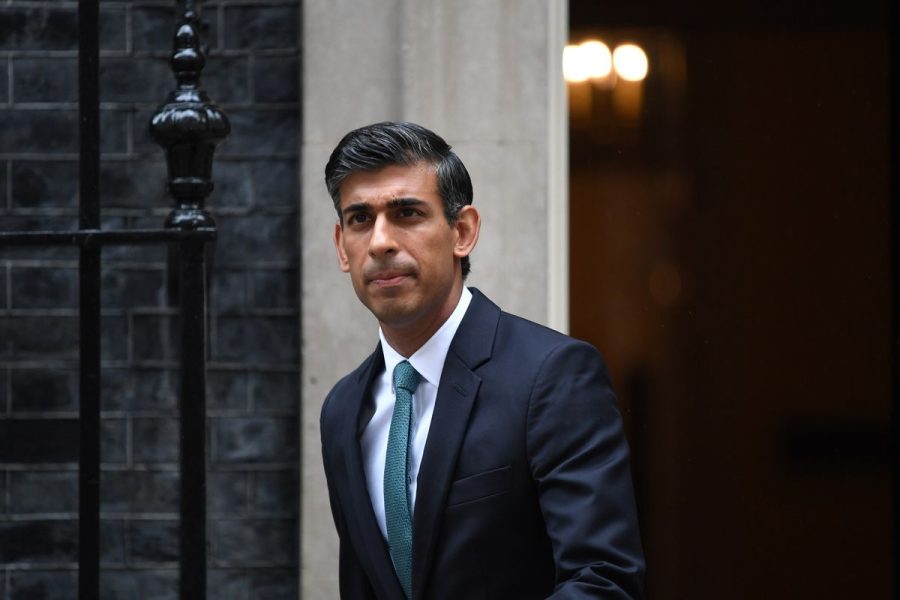OPINION: PM Sunak Not “Reverse Colonization” Many Indians Hope
CC: Chris J. Ratcliffe/Bloomberg
British PM Rishi Sunak outside of No.10 Downing Street in London, England.
November 30, 2022
Announced on the auspicious day of Diwali, a major Indian festival celebrating the victory of light over darkness, was the news of Rishi Sunak’s rise to prime minister of the United Kingdom.
This had scores of Indians celebrating the idea of an Indian-origin man “ruling” their ex-colonizers. Hindi-language newspaper Dainik Bhaskar ran the headline, “Another Diwali gift to the nation, Indian-origin Rishi to rule the whites.” At the same time, The Times of India went with “From Age of Empire to Rishi Raj.”
Indians are mired in the past. At the very core of Hindu-Muslim conflicts in India is also the desire to win against the “Mughal invaders” (who are believed to have destroyed several Hindu temples in their day). A considerable chunk of India’s recent history is dominated by British rule and the sanguinary partition that divided the country into India, Pakistan, and some years later, also Bangladesh. This is why, for a lot of people, Sunak’s prime ministership is a symbolic victory over India’s British colonizers of over 200 years – and this is also why his win has elicited more patriotic reactions than Kamala Harris’s did in the United States as a woman of color with Indian heritage.
This response is a superficial one, dragging people away from reality; practicing Hinduism does not make you Indian, for example. Sunak, the “perfect upper caste Hindu poster boy” is as British as the prime ministers that preceded him; nothing truly revolutionary has taken place. “They (the Conservative Party) have just placed a puppet billionaire who is going to make decisions for one of the most powerful countries and maintain the world order,” said Priyanka Gulati, a recent college graduate from Mumbai, India. “He is a capitalist playing politics and his immigrant identities don’t really hold any weight in his actions,” she added.
Sunak’s decision to re-appoint Suella Braverman as Britain’s Home Secretary, who said, “‘Look at migration in this country – the largest group of people who overstay are Indian migrants,” has been received coolly by many in India. They dislike her anti-immigrant rhetoric and feel it makes the nature of Sunak’s tenure clear. “The timing of her statement, in fact, derailed the much-hyped signing of the Free Trade Agreement,” said Debashish Das, an entrepreneur, based in Delhi, India. They added, “Both, from a trade perspective as well as immigration laws, it is going to get tougher for Indians.”
Nandini Thiagarajan, an Indian student at the University of Leeds, said, “As an international student, specifically an Indian student, I am not happy with the election of Rishi Sunak as prime minister of the UK.” She added, “Personally, this (the Conservative party’s majority anti-immigration policy) poses a problem for me as when the time comes and I need to convert my student visa into a work visa I am worried that I will not be allowed to work here in this country.”
But the new prime minister is more than his race – he is a member of the Conservative Party and a man who comes from a great deal of privilege. Sunak was born to Southeast African-born Hindu parents of Indian-Punjabi descent, making him a third-generation immigrant. He is married to Akshata Murthy, an Indian woman with an $800 million stake in the Indian outsourcing giant, Infosys, making her net worth more than the late Queen Elizabeth II. Sunak and Murthy were in the limelight earlier this year when Murthy was accused of avoiding nearly $20 million in taxes through her non-domiciled status.
Nadia Whittome, a Labor party member of Parliament with Indian heritage, tweeted, “Rishi Sunak and his wife sit on a fortune of £730,000,000.That’s around twice the estimated wealth of King Charles III. Remember this whenever he talks about making “tough decisions” that working class people will pay for.”
There is a trend of ethnic minorities rising to powerful positions of leadership and being appreciated for breaking glass ceilings – two examples here in the United States are Vice President Kamala Harris and former President Barack Obama. But their rises have not translated into making a radical difference in the growth and development of ethnic minority groups in America or poorer less developed countries around the world. Gulati said, “If Indians are thinking that things are going to change now that Rishi Sunak is here, then that’s just a lack of understanding of the global scheme called politics.”
However, it is unfair to disregard the fact that Sunak being the first British prime minister of color acts as hope for the Indian diaspora. Smruti Ranjan Behera, a London-based first-generation immigrant from India, said, “I will probably not vote for Rishi Sunak if he is still around for the elections in two years’ time. However, seeing him up there at 10 Downing St. does trigger some inexplicable sense of hope.”
He added, “My two sons identify themselves as English. They support England at cricket and crave bangers and mash. I have always felt a bit anxious that someone, someday will make them feel like they don’t belong. Seeing Rishi Sunak up there lessens my anxiety a bit. With his example out there, maybe, just maybe my sons can more easily brush off any attempt to “other” them and truly embrace their mixed identity.”


